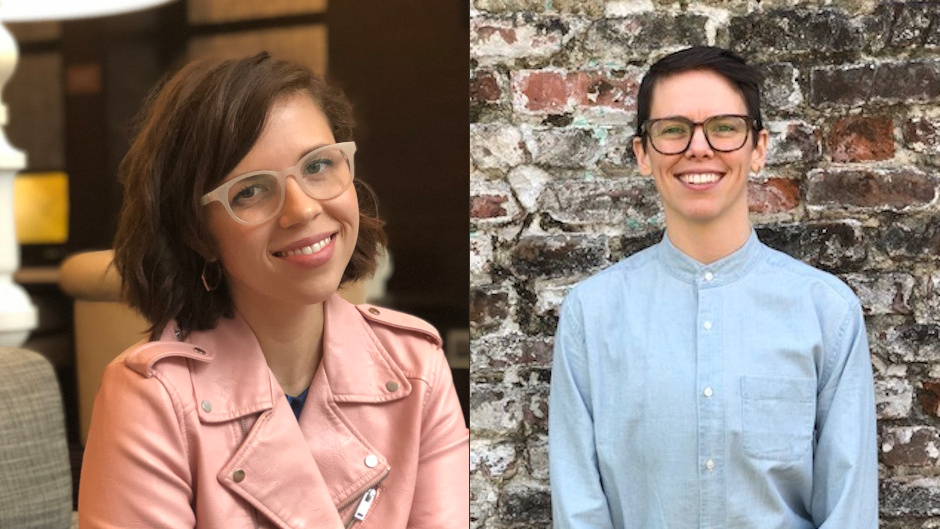Written by: LINDSEY JOHNSON
An impartial jury can be the difference between life and death in the world of criminal defense practice in capital cases. In states that continue to use the death penalty, capital defense advocates often face societal and systemic challenges, such as prejudicial jury pools and antiquated court processes, as they attempt to seat fair and impartial juries. Defense attorneys are tasked with challenging the process to ensure fairness for their clients and two Miami Scholars graduates, Carli Raben, J.D. ’18 and Adrienne Harreveld J.D. ’19, shared their first-hand experiences.
Raben and Harreveld brought their experience and insight back to Miami Law in an engaging and critical conversation as part of the HOPE Public Interest Resource Center’s Social Justice Series. Through the webinar, they shared information about the mechanics of jury selection in death penalty cases, focusing on their fight for fair juries in capital trials in Louisiana. The online event was attended by incoming and current students, alumni, and attorneys near and far.
Raben, a Junior Capital Attorney with the Louisiana Capital Assistance Center, and Harreveld, a Staff Attorney with the Capital Defense Project of Southeast Louisiana, described the complexities of jury selection and highlighted the many ways that minorities are eliminated from the jury pool at each stage of the process.
The discussion touched on how jury selection procedures in death penalty cases tend to skew juries in favor of death and why peremptory strikes may be used to remove people of color from the jury as long as the reason given is not “facially discriminatory.”
“As a person highly invested in the workings of our criminal justice system, I loved hearing about the selection of juries and the different strategies attorneys employ to fill those seats,” said 1L Miami Public Interest Scholar Reunie Faustin.
Raben and Harreveld highlighted the importance of asking the questions people may not want you to ask and the power of investigation. They shared the story of their discovery, during a capital trial, that the list of eligible jurors in Baton Rouge had not been updated in almost a decade, therefore excluding individuals in their late teens and early twenties. The matter went to the Louisiana Supreme Court and the ramifications of this error, which skewed the jury pool against younger defendants by removing large swaths of eligible jury members, are still being addressed in a number of capital cases.
Raben entered Miami Law with a passion for juvenile justice, after serving as a teacher in Louisiana. She worked with community organizers to promote access to justice for underserved communities as a HOPE Fellow with The Community Justice Project in Miami and served as an intern with the Louisiana Center for Children’s Rights in New Orleans.
“I loved being a part of HOPE at Miami Law. It served as a magnet for the most caring and compassionate students to conspire together to make our campus and community a more equitable place,” said Raben.
Harreveld worked on public policy research related to racial equity prior to law school. Harreveld came to Miami Law with the desire to challenge the legacy of Jim Crow that can still be seen in many existing government systems. She interned with the Florida Justice Institute, where she gained experience with civil rights litigation and worked on issues of racial discrimination in the criminal justice system. She was first exposed to discriminatory practices in jury selection during her internship with the MacArthur Justice Center in New Orleans.
“I would not be where I am today if it were not for the foundational skills I learned at my internships. The HOPE Office assisted me in applying to these organizations and helped me extend my 2L internship into a yearlong placement. Throughout law school I felt like I could be fully immersed in the work that motivated me to become a lawyer,” said Harreveld.
Following their presentation, Raben and Harreveld answered questions about how the legal community can address the ongoing challenges that capital defense advocates face in seating fair juries.
Myles Crandall, a first-year Miami Public Interest Scholar, was appreciative of the opportunity to engage in this dialogue prior to beginning classes. “I learned about the importance of diligent research throughout the jury selection process and opportunities for action, including contact with jury commissions.”
HOPE’s Social Justice Series will continue online throughout the academic year.
Read more about the HOPE Public Interest Resource Center
Read more about the Miami Scholars Public Interest Program

